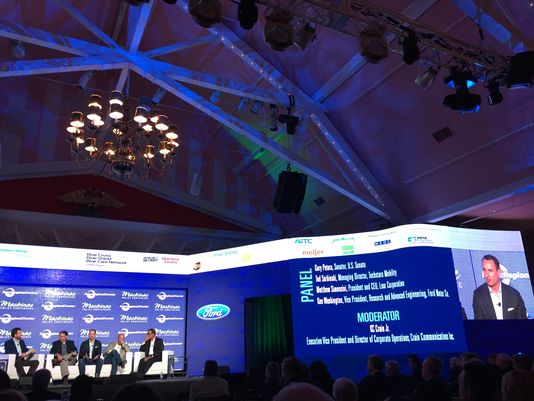OPINION
By Nancy Kaffer
Detroit Free Press
WWR Article Summary (tl;dr) Great piece by Nancy Kaffer of the Detroit Free Press on the lack of women at the Annual Mackinac Policy Conference. It’s a massive event, held each year on northern Michigan’s Mackinac Island. It’s attended by lawmakers, policy wonks, business and civic leaders.
Detroit Free Press
Where are the women?
That’s the question attendees — especially female attendees — of the Detroit Regional Chamber’s Mackinac Policy Conference can’t stop asking.
During an early panel Wednesday morning, I snapped a picture, texting it to my editor with the words, “Congrats, you have an all-male panel.”
I didn’t realize it would be the theme of the day, during which not one woman took the conference stage as keynote speakers or panelists. By noon, I’d heard about it from every woman I’d spoken to. By the end of the day, there was a hashtag.
If you’re not familiar with the Mackinac conference, it’s a massive event, held each year on northern Michigan’s Mackinac Island. It’s attended by lawmakers, policy wonks, business and civic leaders — about 1,600 of them, this year. Discussions center on business, policy, business policy and government. Women, you’ll note, attend the conference (with its nearly $3,000 price tag) in large numbers.
Yet over the course of three days, 41 men, most of them white, will take the stage as keynote speakers or panelists.
And just eight women.
Two women — heroic Flint pediatrician Mona Hanna-Attisha and national journalist Soledad O’Brien — were granted “Mackinac moments,” a 10-minute time slot between main sessions. O’Brien also will be a panelist on Friday.
Pointing out a lack of diversity is the kind of complaint that can cause a certain kind of person to turn off, to dismiss the complainant as shrill, looking for quotas over substance. If men are best suited to discuss a certain topic, why not fill a panel with men?
But the idea that including women should be a priority has nothing to do with quotas over substance. In fact, it’s the reverse.
Ensuring that women are part of a panel, particularly when you’re talking about politics or policy, means reflecting the diverse viewpoints of the state to whom those policies will apply.
And when women aren’t at the table, policy is lopsided.
“There’s an old adage that goes, you can’t become what you can’t see. You have to see it to be it,” said Carolyn Cassin, president and CEO of the Michigan Women’s Foundation, and a chamber board member who wasn’t involved in conference planning.
“And if the most important and powerful conference that brings all business leaders together in the state doesn’t showcase what we are and what we could be, it’s pretty hard to make the statement that you’re representative of the community.”
This dearth of women on panels that discuss topics that affect, you know, women, isn’t specific to the chamber. At Tumblr, “Congrats, you have an all-male panel,” highlights egregious examples (and prompted my text to my editor). And the Gender Avenger website, started by political consultant Gina Glantz and entrepreneur Susan Askew, asks men to sign a pledge that they won’t participate in all-male panels. “Women as equals will become the norm when it is the norm” is the site’s mantra.
The conference is regularly criticized for its lack of racial and economic diversity — something else the chamber must address — and that while conference subjects often relate to Detroit, it’s held hours from Detroit, at an exclusive resort.
Some of that’s inevitable. The chamber is a business organization; its audience and membership are niche, not mainstream. But that’s not a cure-all explanation.
When I asked a spokesman for comment about this year’s gender imbalance, chamber president Sandy Baruah’s e-mailed statement was brief: “We work to balance race, gender and perspective based on the issues we select for each conference. Some years we succeed more than others. We try hard every year, and every year diversity is important as we build the agenda.”
But here’s the thing: If something’s important to you, you do it. There’s no shortage of talented, qualified, successful women in Michigan.
Just look at the chamber’s membership base — or the conference’s attendee list — or the special Mackinac edition distributed Thursday morning by Crain’s Detroit Business, featuring Michigan’s 100 most influential women.
To construct a conference almost entirely devoid of women isn’t accidental. Or, rather, it’s only accidental if reflecting the diverse viewpoints of the community you aim to serve doesn’t matter.














































































































































































































































































































































































